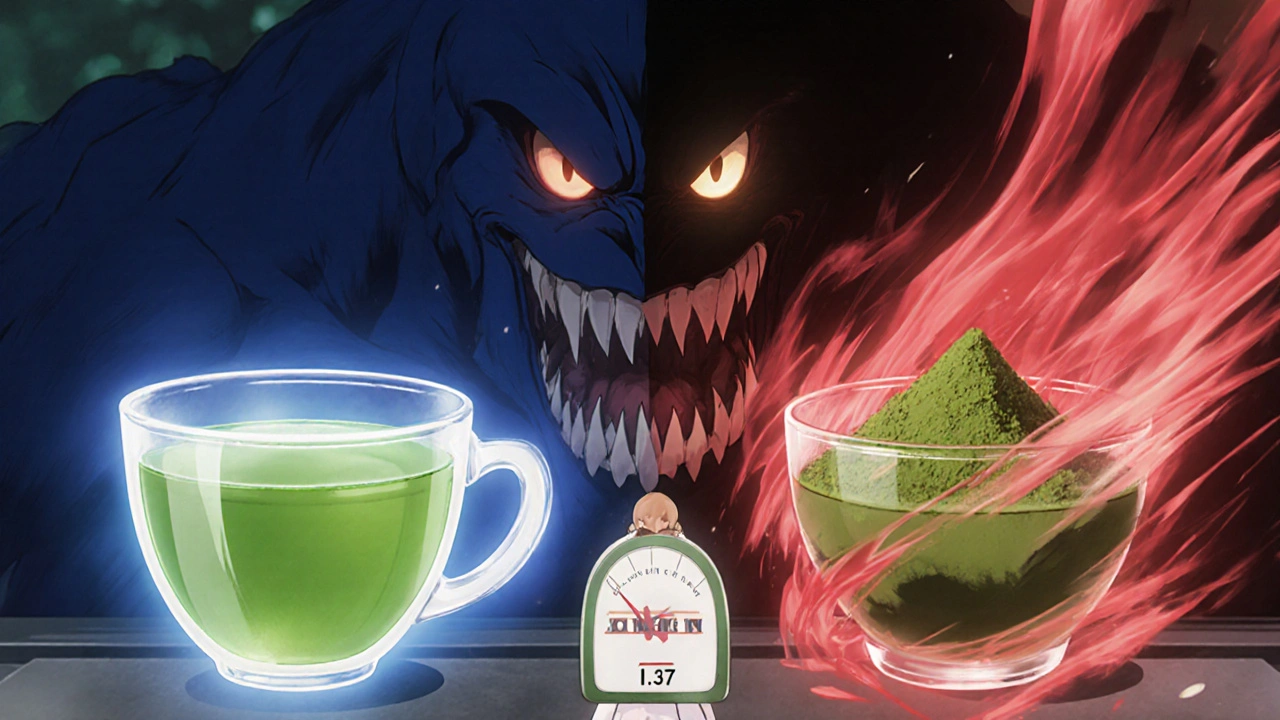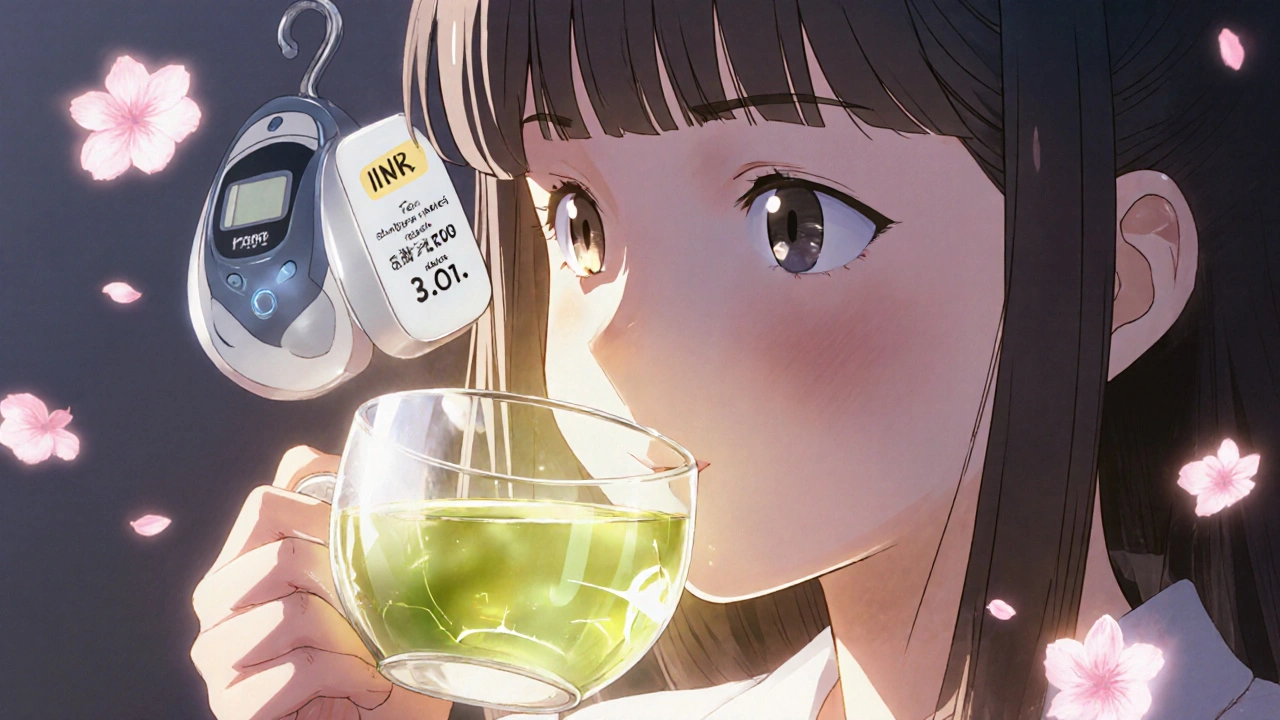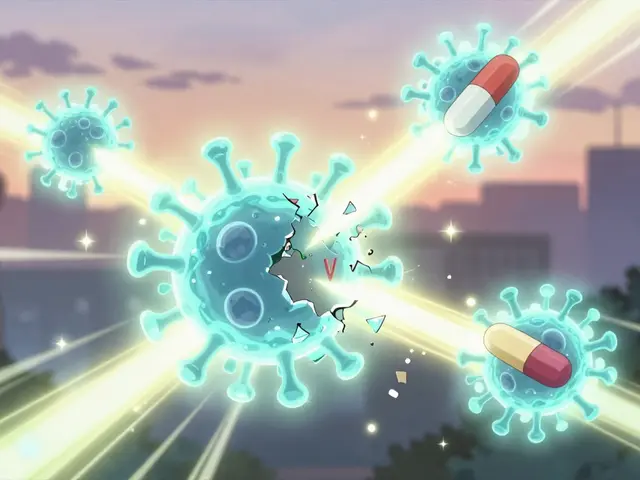Green Tea & Warfarin Calculator
Calculate Your Green Tea Intake
This tool estimates vitamin K content in your green tea consumption and shows potential effects on INR while taking warfarin.
Enter your tea type and amount to see results
When you're on warfarin, your life becomes a careful balance. One small change in your diet can send your INR numbers flying - too high, and you risk bleeding; too low, and you could form a dangerous clot. For many people, green tea seems harmless - it’s healthy, calming, and full of antioxidants. But if you're taking warfarin, that cup of tea might be doing more than just soothing your nerves. It could be quietly working against your medication.
How Warfarin Works - and Why Vitamin K Matters
Warfarin, sold under brands like Coumadin and Jantoven, is a blood thinner that stops your body from making certain clotting proteins. It does this by blocking vitamin K, which your liver needs to activate those proteins. Without enough active vitamin K, your blood takes longer to clot - that’s the goal. But if you suddenly eat or drink a lot of vitamin K, your body has more of the raw material to make clotting factors, and warfarin loses some of its power.
Your doctor checks your blood with an INR test to make sure your clotting time stays in the safe zone - usually between 2.0 and 3.5, depending on why you're on warfarin. If your INR drops below 2.0, your risk of stroke or clot increases. If it climbs above 4.0, you’re at higher risk of bleeding. Green tea can nudge that number in either direction - and the reason isn’t what you might think.
Green Tea Isn’t Just One Thing - It Depends on How You Drink It
Not all green tea is the same. A cup of brewed green tea made from leaves steeped in hot water contains very little vitamin K - about 0.03 micrograms per 100 grams. That’s less than a drop in the bucket compared to your daily needs. But matcha? That’s different. Matcha is made from ground whole tea leaves, so you’re consuming the entire leaf, not just what’s steeped. Matcha can have 10 to 20 times more vitamin K than regular brewed green tea.
And then there’s quantity. Drinking one or two cups of regular green tea a day? Most people on warfarin won’t see a change. But drinking a gallon a day? That’s a different story. There’s a documented case from 2006 of a man whose INR crashed from 3.79 to 1.37 after drinking half to one gallon of green tea daily. He wasn’t eating more spinach or broccoli - just tea. His body got enough vitamin K from the tea to overpower the warfarin.
The Paradox: Green Tea Can Thin AND Thicken Blood
Here’s where it gets confusing. Green tea isn’t just about vitamin K. It also contains catechins - natural compounds that can reduce platelet stickiness. In theory, that should make your blood thinner, not thicker. So why does INR sometimes drop instead of rise?
The answer is timing and dose. If you drink a small amount of green tea, the catechins might slightly enhance warfarin’s effect. But if you drink a lot, the vitamin K overwhelms the system. The net result? Your INR falls. It’s like turning on two opposing switches at once - one weak, one strong. The strong one wins.
That’s why some people on warfarin drink green tea daily and have stable INRs, while others see big swings. It’s not random. It’s about how much you drink, what kind of tea, and how consistent you are.

Green Tea vs. Other Foods: What’s the Real Risk?
Let’s put this in perspective. Spinach has 483 micrograms of vitamin K per 100 grams. Broccoli has 141. A cup of brewed green tea? About 0.03. So why is green tea even on the radar?
Because people drink tea every day - often multiple cups. You might eat spinach once a week. But tea? That’s a daily habit. And habits are hard to change. When you suddenly start drinking five cups a day, or switch from regular tea to matcha, your body doesn’t have time to adjust. That’s when INR drops.
Other substances like cranberry juice reliably raise INR by interfering with how warfarin is broken down. Grapefruit does the same with statins. Green tea? It doesn’t mess with the drug’s metabolism. It just floods your system with vitamin K. That’s why the advice isn’t “avoid it” - it’s “keep it steady.”
What Experts Actually Say - And What You Should Do
The American Heart Association says you can safely drink up to three cups of green tea a day if you keep it consistent. That’s the key word: consistent. If you’ve been drinking one cup a day for months, keep doing it. If you’ve never had it before, start slow - one cup, and watch your INR for a few weeks.
But if you’re drinking matcha daily, or more than 500 milliliters (about two cups) of regular green tea, your doctor may want to check your INR more often - maybe every two weeks instead of monthly. If you suddenly stop drinking green tea after months of daily intake, your INR might spike because your body is no longer getting that vitamin K boost. One woman on warfarin saw her INR jump from 1.7 to 5.0 in just one week after quitting her daily black tea habit.
Doctors at Mayo Clinic and UC San Diego agree: don’t panic. Don’t cut it out unless your INR starts bouncing. But do track it. Write down how much you drink, what kind, and when. Bring that log to your next appointment.
Real People, Real Stories
On the Warfarin Support Group subreddit, users share their experiences. One person, ClotFreeSince2018, drank four cups of matcha daily for two weeks. His INR dropped from 2.8 to 1.9. He had to increase his warfarin dose by 15%. Another user, TeaLover87, has been drinking two cups of regular green tea every day for five years - his INR has stayed perfectly stable between 2.3 and 2.6.
There’s no one-size-fits-all rule. But there is a pattern: consistency beats quantity. Sudden changes cause trouble. Predictable habits don’t.
A 2022 survey found that 62% of warfarin users didn’t even know green tea could affect their INR until they had a problem. That’s not because the info is hidden - it’s because it’s buried under layers of conflicting advice. You’re told to eat more vegetables, avoid cranberry juice, skip alcohol, and now tea? It’s overwhelming.

What to Do Right Now
Here’s what works in real life:
- If you drink green tea regularly (1-3 cups a day), keep doing it. Don’t stop unless your doctor says so.
- If you drink more than 500 mL (about two cups) daily, tell your anticoagulation clinic. They may want to check your INR more often.
- Avoid matcha unless you’re sure how it affects you. It’s not the same as brewed tea.
- If you’re starting green tea for the first time, begin with one cup a day and wait four weeks before checking your INR.
- Never make sudden changes. If you want to stop drinking tea, do it slowly - cut back over a week or two.
And if you’re ever unsure? Call your pharmacist or anticoagulation clinic. They’ve seen this before. They know what to look for.
What’s Next? New Research, New Tools
Scientists are working on solutions. The NIH is funding research into genetically modified tea plants with lower vitamin K content - a future where you can drink green tea without worry. Meanwhile, apps like WarfarinWise now let you log your tea intake and get alerts when you exceed safe limits. In a pilot study, users who tracked their tea consumption saw a 22% drop in INR instability.
But for now, the advice hasn’t changed: know your tea. Know your dose. Know your INR. And above all - keep it steady.
Can I drink green tea while taking warfarin?
Yes, you can - but only if you drink it consistently. One to three cups of regular brewed green tea per day is generally safe for most people on warfarin. The key is not to change your intake suddenly. If you’ve been drinking tea daily, keep doing it. If you haven’t, start with one cup and monitor your INR.
Does green tea raise or lower INR?
It usually lowers INR - meaning it makes warfarin less effective - when consumed in large amounts (more than 500 mL daily). This is because green tea contains vitamin K, which helps your body make clotting factors. However, in small amounts, green tea’s catechins may slightly enhance warfarin’s effect. The net result depends on how much you drink and how consistent you are.
Is matcha tea safer than regular green tea for warfarin users?
No - matcha is riskier. Since matcha is made from ground whole tea leaves, it contains 10 to 20 times more vitamin K than regular brewed green tea. Even one cup of matcha daily can affect your INR. If you’re on warfarin, treat matcha like a potent food interaction - limit it, track it, and talk to your doctor before making it part of your routine.
How much green tea is too much when on warfarin?
More than 500 mL (about two 8-ounce cups) per day increases your risk of INR changes. Drinking over 1 liter (about four cups) daily has been linked to significant drops in INR, requiring warfarin dose adjustments. The American Heart Association recommends limiting intake to 1-3 cups per day, with consistency being more important than the exact number.
Should I stop drinking green tea if my INR drops?
Don’t stop suddenly. If your INR drops and you drink green tea regularly, your doctor may adjust your warfarin dose instead of asking you to quit tea. Stopping green tea abruptly can cause your INR to spike, increasing bleeding risk. The goal is stability - not elimination. Talk to your anticoagulation team before making any changes.
What other teas should I avoid on warfarin?
Black tea has similar vitamin K content to green tea and poses the same risks at high intake. Herbal teas like ginkgo, goji berry, or ginger may increase bleeding risk through different mechanisms and should be used cautiously. Avoid cranberry juice - it reliably raises INR. Stick to plain brewed teas in moderate, consistent amounts, and avoid herbal blends unless approved by your doctor.
Can I drink green tea if I switch to a newer blood thinner like Eliquis or Xarelto?
Yes - and this is one reason many people switch. Newer anticoagulants like apixaban (Eliquis) and rivaroxaban (Xarelto) don’t interact with vitamin K, so green tea, spinach, and broccoli won’t affect them. If you struggle with dietary restrictions on warfarin, talk to your doctor about whether switching is right for you. But if you’re on warfarin, the rules still apply.
Final Thought: It’s Not About Fear - It’s About Control
You don’t need to give up green tea. You just need to know how it fits into your routine. Warfarin isn’t about restrictions - it’s about predictability. Your body works best when things stay the same. So drink your tea. Just don’t surprise it. Keep the amount steady. Track it. Talk to your team. And remember - you’re not fighting your food. You’re learning to live with it, on your terms.






Julie Pulvino
November 24, 2025 at 01:29
Just started drinking green tea last month and my INR stayed stable. I drink two cups a day, regular brew, not matcha. Honestly, I didn’t even know it could be an issue until I read this. Thanks for the clarity!